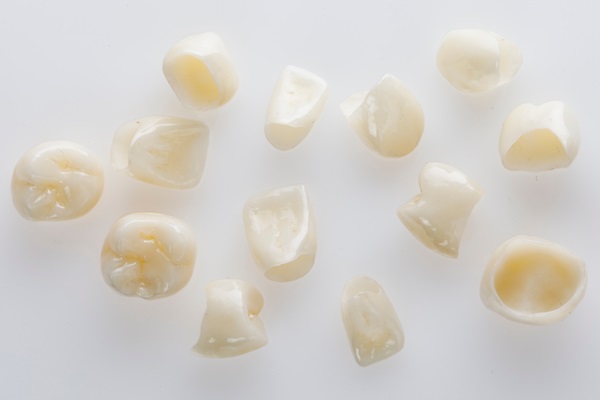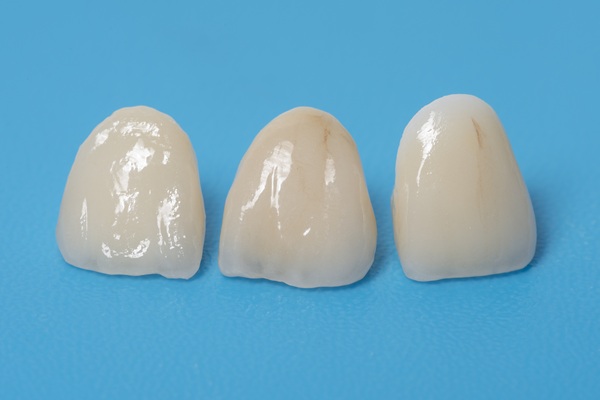When Is Getting a Dental Crown Necessary?

A dental crown can treat many oral issues. Also known as dental caps, crowns cover up damaged teeth completely, instantly restoring their form and function. The cosmetic and restorative properties of caps make them so popular with dentists. A dental crown is a way to extend the life of a badly damaged tooth and avoid the need for tooth extraction.
A potential drawback of a crown can be the cost. Crowns are one of the pricier prosthetics used in dentistry. Most patients would rather not get them unless they are completely necessary. While veneers, inlays, onlays, and dental bonding can fix minor to moderate issues, certain cases necessitate a dental crown.
Figuring out if you need a dental crown
Here are a few legitimate reasons a dentist might want to protect a patient's teeth with a dental crown:
A tooth is cracked or broken
When a tooth hurts after biting down on something, there is a good chance there is a crack in the tooth. A cracked tooth is a severe dental condition that can lead to infection and tooth loss when ignored. However, what looks like a tiny crack to patients is a massive opening for oral bacteria and food particles. The bacteria get to the pulp chamber through the crack and infect the soft tissue there. This situation can lead to severe toothaches and an infection that will spread if left untreated.
A cracked tooth is often treated with a root canal if detected early. The tooth's crown might need lengthening afterward to improve its aesthetics. If the damage is severe, the dentist might decide to extract the tooth and replace it with an implant instead. However, saving the tooth and using a crown is the more economical option.
A crown is the only option
At times, a crown is the most effective way to go about treating a tooth. For example, a tooth that has been seriously damaged by decay can be fixed with a filling, but that will not protect it from further damage. In addition, a large filling can also weaken a tooth, leading to it eventually becoming damaged. Many dentists would prefer to use a crown for patients dealing with such issues since it prevents further decay, improves the way the tooth looks, and restores the lost function of the tooth.
When a root canal is performed
Crowns protect teeth after root canal therapy. A root canal is usually used to deal with severe decay that leads to an infection or damage to a tooth that affects the pulp chamber. The tooth worked on is typically covered with a dental crown to prevent further injury or infection from re-occurring. The molars, in particular, need to be covered with a crown after a root canal since they deal with tremendous forces when grinding down food. It is important to note that the treated tooth is dead after a root canal. Though still operational, because it no longer has a nerve and a blood supply, it is more venerable to damage and decay and needs extra protection.
Paying for dental crowns
If the dentist determines a dental crown is an effective option, it is worth spending the extra money. Going with an inferior fix may lead to future dental problems. By trying to go with the most inexpensive solution, the patient could end up costing themselves a lot more than they would have with the dental crown. For example, tooth replacement can be more troublesome and expensive than crowns.
There are ways to help make the dental crown cost more manageable. Talking to a dentist about the material used during the initial consultation will help patients understand the cost breakdown. Certain materials are less expensive than others. For example, consider composite resin crowns instead of more expensive ceramic crowns. Also, metal crowns can be less costly and are appropriate for the back molars that are not as visible. The dentist can discuss the pros and cons of each material option.
Ask the dentist about payment options. These can include financing and payment plans. In many cases, dentists understand that dental work is spendy. They want to avoid worries over cost interfering with patients getting the dental care they need. Patients should check with their dental insurance to see what they cover. For the uninsured, programs may be available to help cover needed dental treatments.
Schedule a consultation today
Are you struggling with an oral issue that might require a crown? We can help. Contact our Stockton office to explore your options.
Request an appointment here: https://www.martinimplants.com or call Martin Dentistry at (209) 299-7907 for an appointment in our Stockton office.
Check out what others are saying about our dental services on Yelp: Dental Crowns and Dental Bridges in Stockton, CA.
Related Posts
In some form, dental crowns have been a part of dentistry for centuries. This treatment is an important restoration method for people who have severe tooth decay. Cosmetic dentistry also uses crowns to improve patients’ smiles. If you are unhappy with the appearance of your teeth, a crown could be the right solution. Your dentist…
Dental crowns are a great way to restore the health and appearance of your smile after oral health issues develop. Dental crowns work by surrounding a vulnerable or damaged tooth and offering protection from further damage. Crowns may also be used for teeth replacement purposes as well.Several of the more common oral health issues that…
Dental crowns are dental restorations that cover teeth entirely for added protection, improved function, and cosmetic purposes. Dental crowns are versatile treatment solutions, and there are many reasons that a dentist may recommend this treatment for patients.The most common reasons that dentists recommend a dental crown are to protect a tooth that is weakened or…
Dental crowns are well-known for their ability to create beautiful smiles, but they can also be used for various other purposes. Dental caps are used not only for smile makeovers but also to restore teeth that may otherwise be extracted due to gum disease or cavities. Dentists and their patients often prefer crowns because they…


